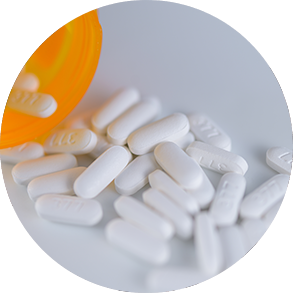Benzodiazepines (or tranquilizers) are a class of prescription drugs used to treat conditions such as anxiety, insomnia, and seizures. Users often develop a dependence on benzodiazepines, or benzos, after taking high doses of them for a long time. As tolerance gets stronger, the user needs higher doses of these drugs to feel the same effects. When someone with a dependence suddenly stops taking these drugs, they may experience a reaction referred to as withdrawal. Our benzo detox center offers medical withdrawal treatment to aid individuals through this process.

Benzodiazepine Withdrawal Symptoms
Symptoms of withdrawal are highly variable and often come and go, varying in frequency and severity depending on factors like the duration of the person’s use, doses taken, age, metabolism, other medical conditions, and more. The withdrawal symptoms of benzos are physically and emotionally painful. They can even become life-threatening if the user quits “cold turkey.” Those with a history of severe and long-term abuse often experience more severe withdrawal symptoms.
The most common benzo withdrawal symptoms are known as “rebound” symptoms, which refers to the resurfacing of symptoms that these drugs were originally taken to treat. They usually manifest within one to four days following discontinued use, depending on the benzo used, doses, duration of use, and other factors.
Common benzo withdrawal symptoms:
- Anxiety
- Cravings
- Difficulty concentrating
- Excessive sweating
- Hand tremors
- Headache
- Heart palpitations
- Increased tension
- Muscular stiffness or discomfort
- Panic attacks
- Sleep disturbances
Is Benzo Withdrawal Life-Threatening?
Yes, when someone has a serious dependence on the substance, withdrawal from benzodiazepines can occasionally be life-threatening. Seizures and delirium tremens, both of which can be fatal, are just two withdrawal symptoms that can result from abruptly quitting benzodiazepines. Long-term benzodiazepine usage can also change the chemistry of the brain, and withdrawal can overstimulate the nervous system and result in seizures or even death. It is essential to seek medical help to reduce the risk of potentially fatal problems during the withdrawal process. More severe symptoms of benzo withdrawal include hallucinations, psychosis, and an increased risk of suicidal ideation.
The Benzo Withdrawal Timeline
Benzodiazepines’ half-life (how long they last in the body after consumption) varies by formulation. For instance, withdrawal symptoms from short-acting benzos occur sooner than those of long-lasting benzos because it takes less time for the drug to leave the person’s system. Short-acting benzos include Xanax, Dormonoct, and Halcion, while long-lasting benzos include Valium, Klonopin, and Librium.
For those who have used benzodiazepines for a long time, withdrawal from them can be challenging. Depending on the amount of dependence and the benzodiazepine that was taken, the withdrawal process can be divided into three stages. The initial stage starts soon after the last dose and involves the first round of symptoms. The second stage has more severe symptoms and might linger for several weeks. The last stage contains more enduring symptoms and might last for several months.
It is important to keep in mind that the withdrawal process and symptoms can vary greatly across people. Therefore, it is imperative to get medical help and support at this time. Our medical detox program or gradual tapering of the medicine over several weeks or months may be required to guarantee a secure transition to sobriety and reduce withdrawal symptoms. Critical elements of the process include self-care, asking for help from family members and mental health specialists, and being patient and compassionate with oneself.
Benzo Withdrawal Treatment
Oftentimes, benzo withdrawal contributes to addiction because users experiencing withdrawals will continue taking drugs to prevent them. Therefore, benzo detox is the first step in treating a benzodiazepine addiction.
However, if detox for benzodiazepine abuse is not done properly, withdrawal symptoms can become lethal. Quitting cold turkey can also lead to dangerous and even fatal outcomes. For this reason, it’s important to reach out to a facility that offers medically led treatment for benzo withdrawal, such as our inpatient Sebring, FL, drug rehab.
Medically assisted detox involves tapering down from the drug. Tapering down can include reducing the dose or prescribing a benzo that is less potent. The technique is determined by the severity of the person’s addiction and the type of drug that was abused.
Benzo detox centers aren’t the solution to addiction, however. Long-term sobriety requires further care and ongoing support. Following detox, clients at our drug rehab in Sebring, FL, can then begin working with our therapists and counselors to replace old habits with healthy ones that will help them sustain their sobriety.
For more information about our benzo detox or other forms of Sebring drug treatment, contact Banyan Treatment Centers today.
Related Reading:





